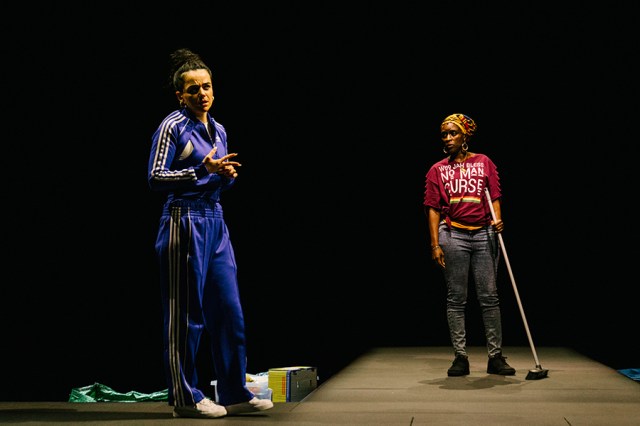Death of England: Closing Time at the National Theatre – review
Clint Dyer and Roy Williams’ piece completes a series of four stand-alone plays revolving around the same family

What an achievement the four plays that make up Death of England have been. From the opening salvo in 2020 when Rafe Spall’s furious, drunken Michael Fletcher swaggered onto the stage, cursing and crying over the death of his racist, Leyton Orient supporter father, to this quieter, more reflective duologue for a Black mother and her white not-quite daughter-in-law, the quartet has painted a recognisable picture of England.
Clint Dyer and Roy Williams’ family saga represents something you don’t always see on stage: something that is true to the life around it. Every play in the series has been painstakingly honest, willing to grapple with the complexities of Britain today in ways that reveal compassion and love, as well as racism and fear – sometimes in the same sentence, the same heartbeat.
Closing Time has been unfortunate in that it has – like the entire sequence – been affected by Covid. Illness caused the postponement of its opening night and the cancellation of some performances. Jo Martin, the actress originally cast as Denise, has been replaced by Sharon Duncan-Brewster who takes to the stage script in hand. Yet she still blazes.
Hayley Squires plays Carly, sister of Michael, white partner to Denise’s son, Delroy, mother of her grandchild, the significantly-named Meghan. “I don’t know whether Delroy is trying to be nouveau riche or nouveau radical,” Denise tuts in despair. The two women are packing up the business they have run together, its failure draining away both their life savings and their sense of hope.
Bitterness and recrimination fill the air, as they prowl the space of the Dorfman, configured on Sadeysa Greenway-Bailey and ULTZ’s set as four walkways in the shape of a George Cross, memento cabinets pinned to the walls, cleaning trolleys crammed into the spaces on the floor, among the audience. As the women talk they gradually reveal that the business has flopped not only because of the tough economic conditions but because Carly has said something that has revealed she may be her father’s daughter in ways that she did not recognise.
The writing is tough and flexible, full of vivid images – “she made a Frieda Kahlo painting look anaemic” – alongside the language of the street. Dyer also directs and makes the story theatrical. When Carly describes the effects of falling in love with Delroy, the moment she clapped eyes on him, a spotlight and rising smoke emphasise the depth of her passion. When Denise recites the conflicting family reactions to the coronation of King Charles, in a revealing yet funny monologue, she sits on a chair draped in a Union Jack.
The first half feels slightly too long, but then the narrative twists and grips, pushing forwards to a conclusion that is tentatively optimistic. As Carly, Squires is wonderfully convincing, hair pulled back tight, fingers jabbing the air, pugnacious and buoyant, reluctant to examine her folly because she is fearful of what it might expose. As Denise, Duncan-Brewster conveys the dignity of the long-suffering, but mingles it with a vibrant willingness to keep pushing forward, to keep reaching for the new England that is always eluding her. It’s a terrific accomplishment all round.
















